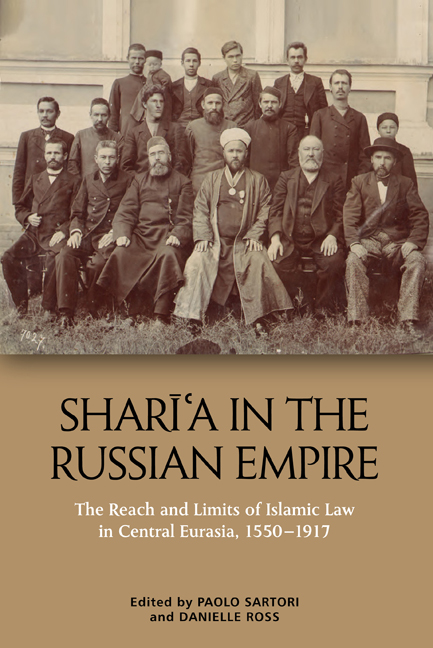Book contents
- Frontmatter
- Contents
- List of Contributors
- Introduction: The Reach and Limits of Sharīʿa in the Russian Empire, c.1552–1917
- 1 Islamic Education for All: Technological Change, Popular Literacy and the Transformation of the Volga-Ural Madrasa, 1650s–1910s
- 2 Taqlīd and Discontinuity: The Transformation of Islamic Legal Authority in the Volga-Ural Region
- 3 Debunking the ‘Unfortunate Girl’ Paradigm: Volga-Ural Muslim Women’s Knowledge Culture and its Transformation across the Long Nineteenth Century
- 4 Between Imperial Law and Islamic Law: Muslim Subjects and the Legality of Remarriage in Nineteenth-century Russia
- 5 Islamic Scholars among the Kereys of Northern Kazakhstan, 1680–1850
- 6 Tinkering with Codification in the Kazakh Steppe: ʿĀdat and Sharīʿa in the Work of Efim Osmolovskii
- 7 Taqlīd and Ijtihād over the Centuries: The Debates on Islamic Legal Theory in Daghestan, 1700s–1920s
- 8 Kunta Ḥājjī and the Stolen Horse
- 9 What We Talk about When We Talk about Taqlīd in Russian Central Asia
- 10 Take Me to Khiva: Sharīʿa as Governance in the Oasis of Khorezm (Nineteenth Century–Early Twentieth)
- Index
8 - Kunta Ḥājjī and the Stolen Horse
Published online by Cambridge University Press: 22 September 2020
- Frontmatter
- Contents
- List of Contributors
- Introduction: The Reach and Limits of Sharīʿa in the Russian Empire, c.1552–1917
- 1 Islamic Education for All: Technological Change, Popular Literacy and the Transformation of the Volga-Ural Madrasa, 1650s–1910s
- 2 Taqlīd and Discontinuity: The Transformation of Islamic Legal Authority in the Volga-Ural Region
- 3 Debunking the ‘Unfortunate Girl’ Paradigm: Volga-Ural Muslim Women’s Knowledge Culture and its Transformation across the Long Nineteenth Century
- 4 Between Imperial Law and Islamic Law: Muslim Subjects and the Legality of Remarriage in Nineteenth-century Russia
- 5 Islamic Scholars among the Kereys of Northern Kazakhstan, 1680–1850
- 6 Tinkering with Codification in the Kazakh Steppe: ʿĀdat and Sharīʿa in the Work of Efim Osmolovskii
- 7 Taqlīd and Ijtihād over the Centuries: The Debates on Islamic Legal Theory in Daghestan, 1700s–1920s
- 8 Kunta Ḥājjī and the Stolen Horse
- 9 What We Talk about When We Talk about Taqlīd in Russian Central Asia
- 10 Take Me to Khiva: Sharīʿa as Governance in the Oasis of Khorezm (Nineteenth Century–Early Twentieth)
- Index
Summary
Introduction
This paper is a contribution to the study of Kunta Ḥājjī al-Iliskhānī (1830?–67), the famous Chechen Sufi who is still enormously popular in Chechnya. Reportedly a representative of the Qādiriyya brotherhood, Kunta Ḥājjī established a Sufi network in Chechnya, Ingushetia and parts of Daghestan, and came into conflict with a rival brotherhood, the expanding Naqshbandiyya khālidiyya that had its stronghold in central Daghestan. According to Russian reports he was rebuked by jihād leader Shāmil (Shamwīl, Imām in central Daghestan and parts of Chechnya from 1834 to 1859), apparently on the issue of the loud dhikr ceremonies that Kunta and his disciples practiced, with round dances, chanting and musical instruments. Kunta is said to have rejected Shāmil's jihād, and to have called for non-violent resistance against the Russians instead. Many historians see him as a strong proponent of customary law (ʿādāt) against Islamic law. According to the many Chechen and Russian accounts, Kunta escaped conflict with Shāmil by making a second hajj pilgrimage, from which he returned in 1862. He then gained more adherents who were dis¬satisfied with the long and unsuccessful militant resistance to the Russians, and placed his representatives in various villages. The Russian authorities soon became suspicious of Kunta's network, which they apparently saw as a parallel administration.
In the last days of 1863, Kunta and some of his murīds were imprisoned, and exiled to the Vologda area of Russia's north. In 1864, a rebellion of his remaining murīds in Chechnya – armed with nothing but daggers, and apparently motivated by the expectation of the End of Times – was blood¬ily suppressed by the Russian military. The movement disintegrated into several groups called wirds (from the Arabic word for ‘Sufi litany’), which were led by his disciples of the first and second generations. Next to the ‘Kunta Ḥājjī’ wird proper, today there are still other groups that emerged by names such as ‘Bammat-Gireis’, ‘Ali-Mitaevs’ and ‘Chim-Mirzas’. These Sufi groups still exist today. Often with hereditary leaderships, these branches of the Kunta Ḥājjī network differ in their male headdress and the musical instruments they use, and some groups allow women to participate in their round dances while others do not.
- Type
- Chapter
- Information
- Shari'a in the Russian EmpireThe Reach and Limits of Islamic Law in Central Eurasia, 1550-1917, pp. 281 - 298Publisher: Edinburgh University PressPrint publication year: 2020



